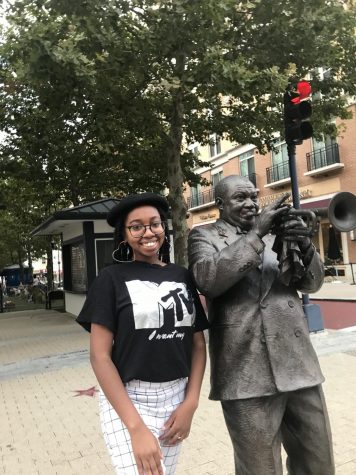At San Diego State, celebration rests in the romantic love shared between individuals of different cultural backgrounds. This can be a vibrant way to experience healthy love — something everyone deserves.
Legend Foster, a fourth-year chemistry major, identifies as a Black woman from Atlanta, Georgia, and attributes her first glimpse of an interracial relationship to the 1997 remake of “Cinderella.”
“My childhood crush was on Brandy’s Prince, Paolo Montalban, and I would watch ‘The Karate Kid’ from 1984 and I was just in love with Ralph Macchio. There are so many different actors, musicians and entertainers that weren’t Black and I was very vocal about my attraction to them.”
Dating Richard, who identifies as Vietnamese American, has provided Foster with a new lens to deeper appreciate her Blackness and believes having uncomfortable conversations about culture is why they’ve lasted.
“Before we started dating, there were things Richard thought about African Americans or wasn’t aware of certain microaggressions until I would say, ‘Did you hear yourself, did you hear what you just said? You don’t think anything’s wrong with that?’” Foster said. “He’s always been receptive, never defensive and he’s always open to having conversations for an overall different mindset that’s more conducive to interacting with Black people outside of me.”
Elise Gary, a first-year public health major, who began dating her white partner in January 2020, believes it’s time to normalize interracial relationships.
“You’re going to meet different people from different walks of life, so it should be pretty normal,” Gary said. “We may share the same racial background but it doesn’t mean they’ll be the person to satisfy my needs and wants. It’s about the person who’s going to treat me right and likes the same nerdy things I like.”
Gary, a Black woman, is a member of BlacQ Space and said fellow club members expressed support when she told them about her relationship. Her family is also supportive but made jokes at first.
“Some of them will crack a few jokes about my boyfriend being a white dude, like ‘Can he handle spice?’ or ‘Can he dance?’, The answer is no, he cannot dance, but we are working on that.”
Identifying as queer, Gary appreciates her partner’s acceptance of her full identity.
“Sometimes, you have to reiterate all Black lives matter because people forget Black queer people exist and my life matters too,” Gary said. “My partner accepts me and doesn’t sexualize my queerness.”
Gary said her partner makes an honest effort to also educate himself about social issues within the Black community.
“It’s really comforting to not have to sit down and say, ‘These are Black people, this is what we do.’ If he doesn’t know something, he’ll say, ‘I know you aren’t the person to give me all this information, I can Google it but I want to know your perspective too,’ and as a Black woman, to be listened to is very rare,” Gary said.
Ashlie Wakatani, a fourth-year accounting major, says her family considers it taboo to marry someone of a different ethnicity until someone is brave enough to do so first.
“My cousin married someone white and everyone was like ‘Okay, now you’re able to marry a white person,’” Wakatani said.
Wakatani identifies as Japanese-American and has felt supported when introducing boyfriend Michael, who is white and Japanese, to her friends.
“It’s kind of funny to bring cultural differences together, it almost feels like I’m introducing my friends to new foods,” Wakatani said.
Interracial relationships shouldn’t be objectified or sexualized – nor should they be regarded as a brochure, a political statement and certainly not a fetish of any kind.
“I know lots of people whose parents are a white man and an Asian woman, and I feel like that’s normalized, especially when you look at TikTok and jokes online about fetishizing,” Wakatani said. “Michael doesn’t do that to me, he’s never done that.”
Foster believes SDSU’s efforts to strengthen the interracial relationship culture on campus could use some improvements.
“SDSU doesn’t really do a good job at bridging even friendships, let alone romantic relationships with race relations on campus,” Foster said. “In general, they need to do better with incorporating the non-Black sector of students and faculty to the Black population on campus.”
Conversely, Wakatani appreciates SDSU’s resources to raise awareness surrounding social issues that may affect her relationship with Michael.
“SDSU’s diversity and inclusion training helps with learning about bias against interracial relationships and it opened my eyes to know more about interracial dating, systemic racism and performative activism,” Wakatani said. “I didn’t know about them before and I feel like I wouldn’t have without those workshops.”
Students like Foster, Gary, Wakatani and many others have fruitfully chosen to explore interracial dating. By doing so, they are breaking barriers and rewriting their cultural perceptions – bold concepts SDSU students embrace.












